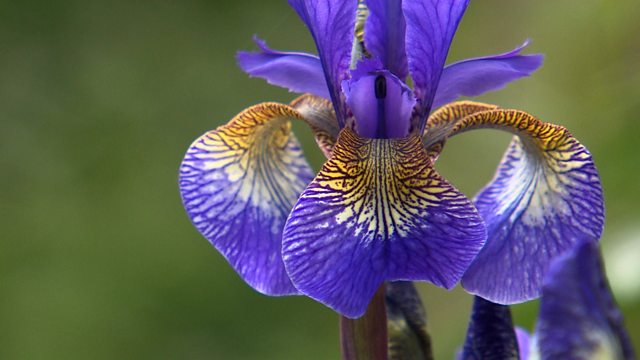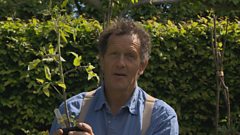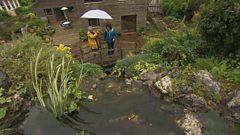
Episode 12
Over 400 gardens in England and Wales are getting ready to open to the public for the National Gardens Scheme. Carol Klein visits one of them as they prepare for the big event. It's an eventful day at Longmeadow too, as a local beekeeper arrives with a swarm for Monty's new hive.
Last on
Clips
-
![]()
How to plant tomatoes
Duration: 03:52
-
![]()
Dragons Glen
Duration: 02:38
Beekeeping

If you are interested in keeping bees, it is advisable to start with some training. There are plenty of courses available in both traditional beekeeping, for harvesting honey; and in natural beekeeping, a more hands-off method resulting in little or no honey. For people thinking about taking up beekeeping (in an urban or rural setting) the National Bee Unit (NBU) would suggest the following points:
- Join your local beekeeping association where a wealth of husbandry advice and training is available from beekeepers who have many years of experience.
- Honey bees can be affected by a number of pests and diseases so training in what to look for and how to manage them is a must. Again, your local beekeeping association will be able to help. In addition, there are extensive advisory leaflets published by the NBU which offer guidance on most of the pests and diseases. See Related Links for more details.
- Beekeepers are encouraged to register on the National Bee Unit’s database ‘BeeBase’. This enables the beekeepers to keep up to date with current information and receive alerts if there are any particular pests or diseases found within 3km of their registered apiaries.
- Getting a swarm isn’t the best way to obtain bees unless you know where it has come from and what the temperament of the bees is like. Best practice would be to find a supplier via your local beekeeping association and then go and look at the bees before you buy.
1. Any nuisance factor they may cause to neighbours.
2. Location of hives so that they can easily be monitored and access is such that the regular husbandry required is manageable.
3. Regular monitoring to prevent swarming.
If your bees do start to swarm or you happen to come across a swarm, please don’t attempt to tackle it yourself. Instead, contact your local swarm collector.
(www.bbka.org.uk)
Moss garden featured
Windy Hall
Crook Road
Windermere
Cumbria
LA23 3JA
Diane Hewitt and David Kinsman are opening their beautiful fellside garden for the NGS on Sunday 6 May (10.30am - 5.00pm) and then again on Sunday 3 June (10.30am - 5.00pm). Group visits are also welcome by appointment from April to August. For further details, click on the link below.
(www.mgs.org.uk)
Sloping garden featured
Dragons Glen
17 Great
Lane
Clophill
Bedford
MK45 4BQ
What Kate Gardner has achieved with her dry, sloping garden is quite astonishing. If you fancy a visit, she’s open for the NGS on Sunday 7 June (2.00-5.30pm) and then again on Sunday 6 September (2.00-5.30pm). Visits are also welcome by appointment from June to September. Click on the link below for more information.
(www.ngs.org.uk)
Jobs for the weekend: Plant out pumpkins, squashes & courgettes
Now that the weather has warmed up and the danger of a frost has gone, pumpkins, squashes & courgettes can be planted out. They are greedy feeders and need plenty of moisture, so it’s worth adding plenty of well-rotted organic matter to the planting hole. If you plant them in a shallow depression, this will help to prevent water from running off when you give them a drink.
(www.rhs.org.uk)
Jobs for the weekend: Water newly-planted trees & shrubs
As the weather warms up, it’s really important to make sure that newly-planted trees and shrubs do not run short of water. A good soaking once a week will really help them to get established and put down a good root system for the years ahead.
(www.rhs.org.uk)
Jobs for the weekend: Cut off rhubarb flowers
Rhubarb can be harvested for another month, but to get the best from your plants it’s worth removing any flowers that appear, as these will use up valuable energy. Simply cut them off at the base, chop them up and add to your compost heap if you have one.
(www.rhs.org.uk)
Credits
| Role | Contributor |
|---|---|
| Presenter | Monty Don |
| Presenter | Carol Klein |
| Series Producer | Chloe Rawlings |
| Series Editor | Liz Rumbold |
Broadcasts
- Fri 5 Jun 2015 20:30
- Sat 6 Jun 2015 18:00
- Sun 7 Jun 2015 08:00
- Fri 12 Jun 2015 08:15
- Sun 14 Jan 2018 07:45


